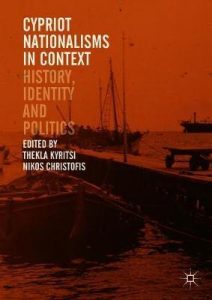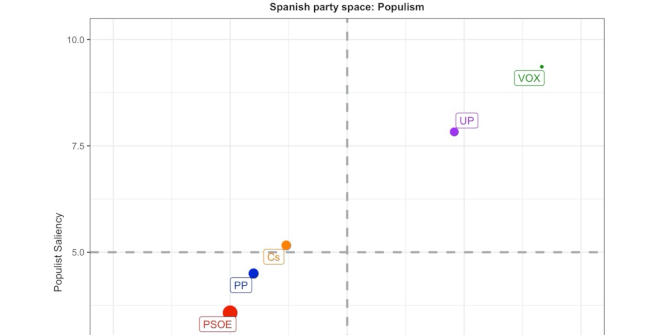In Cypriot Nationalisms in Context: History, Identity and Politics, Thekla Kyritsi and Nikos Christofis bring together contributors to examine historical and contemporary moments of nationalism in Cyprus and their attendant narratives through an interdisciplinary perspective. The book will be useful to academics and students of modern Cyprus and shines when exploring the lesser-studied new and traditional communities of Cyprus, yet greater attention to this aspect would have enabled the collection to convincingly push beyond the tropes of nationalism and identity formation it seeks to call into question, writes R M Christofides.
Cypriot Nationalisms in Context: History, Identity and Politics. Thekla Kyritsi and Nikos Christofis (eds). Palgrave Macmillan. 2018.
Recent years have seen a proliferation in modern Cyprus studies, not least in the fields of history, politics and anthropology, exemplified by the work of academics such as Rebecca Bryant and Yiannis Papadakis. The scholarly boom has generally centred on the island’s nineteenth- and twentieth-century conflicts and divisions. This troubled history is generally referred to as the ‘Cyprus Problem’, the ‘Cyprus Dispute’ or, somewhat euphemistically, the ‘Cyprus Question’.
It’s no surprise, then, that Cypriot Nationalisms in Context – based on the proceedings of a 2013 conference held in the Cypriot capital, Nicosia – also centres on the Cyprus ‘Question’. This is how the collection chooses to label the various colonial and post-colonial movements, schisms and conflicts that have led to the unresolved division of the island into the Greek-speaking Republic of Cyprus and the Turkish-speaking state of the Turkish Republic of Northern Cyprus (TRNC), recognised only by Turkey. This divide has existed since 1974 following the Greek-backed coup and Turkish military invasion of the north of the island.
The focus in modern Cyprus studies has, more often than not, been the key moments commonly understood to have fashioned the current status quo, such as the anti-colonial movement of the late 1950s, the inter-communal violence of the early post-colonial years and both the internal and wider geopolitical tensions that led to the catastrophe of 1974. The essays here, aimed at an academic audience, delve instead into overlooked aspects of modern Cypriot history that help reframe those key moments and their attendant narratives.
The first part of the book, ‘Early Agents of Nationalism’, details how influential Greek émigrés, British political frameworks and the understudied role of women add nuance to the pre-history of nationalism in Cyprus, especially Greek nationalism. The second part of the book, ‘Moments of a Mass Movement’, analyses the seeds of right-wing fervour sown in the anti-colonial movement from the 1930s and how the Hellenisation of anti-colonial feeling damaged Greek Cypriot and Turkish Cypriot relations. The book ends with an innovative fourth section on ‘The Local and the Global’, which counterpoints the Cyprus ‘Question’ with Malta, Latin America and leftist politics in Greece and Turkey.
Part Three, ‘National Identity and the Development of Prejudice’, is the most instructive. This section looks predominantly at changes to, and challenges faced by, post-1974 notions of identity. It includes a welcome overview by Sossie Kasbarian of the Armenian Cypriot experience, which exemplifies the polyculturalism of Cyprus disavowed by Greek and Turkish nationalism. Kasbarian outlines the mutable and sometimes contradictory relationship between the Armenian Cypriot community (which dates back to at least the sixth century), the island’s newer, post-Soviet Armenian community, the Republic of Armenia itself and the international diaspora (182; 183–85). Kasbarian reminds us that Armenian Cypriots displaced by Turkish forces in 1974 were not counted as refugees, diminishing their loss (191). This chapter shows the extent to which Greek and Turkish nationalisms dominate every context in Cyprus, simultaneously offering an alternative to those particular nationalisms. At moments like this, the collection is at its very best.
Despite its many positive aspects, and its potential usefulness to academics and students of modern Cyprus, there are two issues that deplete the scholarly value of this collection. First, to be blunt, the proofreading is poor. This amounts to recurrent problems with syntax and diction, as well as punctuation, that simply do not belong in an academic book. But the issues are not merely ones of grammatical pedantry. It’s incredibly hard, for instance, to take seriously a chapter on the development of prejudice in young children that twice refers to ‘colored’ children (222). Here, the authors of the chapter appear to be replicating the language utilised in a 1947 study they are paraphrasing; yet, this is not made clear in the passage, meaning this racist term is used without context or explanation. To be clear, describing someone as ‘coloured’ is offensive. Such instances required, somewhere along the line, contributors, editors or proof-readers to demonstrate more rigour, not least as a courtesy to some of the fine Cyprus historians and political scientists who contributed to this volume.
The second issue is the theoretical narrowness. The editors bemoan the lack of work ‘that looks at the phenomenon of nationalism in an interdisciplinary way’ and claim Cypriot Nationalisms in Context to be ‘an attempt in that direction’ (5). However, in various fields of the social sciences and arts, for instance, many have re-examined nationalism in Cyprus through the lens of a wide range of methodological approaches – from deconstruction to queer theory to affect theory. This includes the work of Vassos Argyrou, Mary N Layoun and, more recently, the work of Stavros Stavrou Karayanni, as well as Bryant and Papadakis. These, and others, have tried to think beyond the binary of Greek Cypriot and Turkish Cypriot, a binary that emphasises difference rather than commonality, sidelining the other communities that made up, and make up, Cyprus.
On that front, the collection is caught in a vicious cycle of its own making. The introduction highlights the ‘bipolarity of this whole historical scheme’ (12), yet past, present and future identities beyond the ubiquitous Greek Cypriot and Turkish Cypriot opposition barely register here. Methodologically, Cypriot Nationalisms in Context reproduces the very chauvinism it seeks to challenge. The Romanians, Bulgarians and Russians who call Cyprus home are not sudden arrivals. Neither are the Sri Lankan, Vietnamese and Filipino service-sector workers, long-standing contributors to many households, and an uncomfortable modern mirror to the practice of black Cypriot servants that continued well into the British colonial period. Only Kasbarian’s excellent chapter, one out of fifteen, addresses the traditional ‘other’ communities of Cyprus – Maronite, Armenian and Roman Catholic.
That the collection fails its own litmus test of what the conditions of possibility are for a free Cyprus demonstrates, above all, a widespread tendency to recapitulate the prejudices of the Cyprus ‘Question’, a tendency from which academic research is clearly not immune. By its elision of both the new and traditional communities of Cyprus, Cyprus Nationalisms in Context comes far too close – despite its better intentions – to reinforcing, rather than problematising, an antithesis between Cypriots who can only be either Greek or Turkish. It is, instead, the marginal moments of this study – asides about the island’s crypto-Christian sects, its contemporary diversity, its longstanding Maronite and Roman Catholic communities – that required greater attention for this collection to break out of the very tropes of nationalism and identity formation it tries to call into question. The biggest Cyprus ‘Question’ may well be when those marginalised narratives will be fully integrated into the cultural, political and academic discourse that seeks a peaceful, unified and diverse Cyprus for all.
Please read our comments policy before commenting.
Note: This article is provided by our sister site, LSE Review of Books. It gives the views of the author, not the position of EUROPP – European Politics and Policy or the London School of Economics. Featured image Credit: Alexander Gerst CC BY SA 2.0.
_________________________________
R M Christofides – University of Liverpool
R M Christofides is an English lecturer at the University of Liverpool. His current research examines racial discourses in Shakespeare scholarship. His last book, Othello’s Secret: The Cyprus Problem, explores the relationship between Othello and Cyprus.


 Find this book:
Find this book: 


